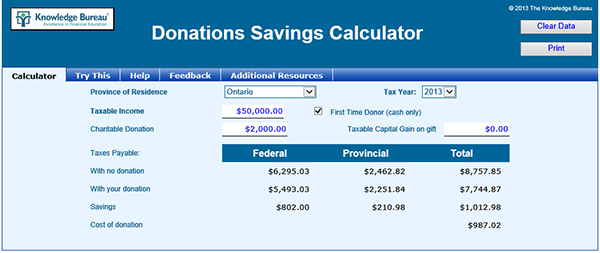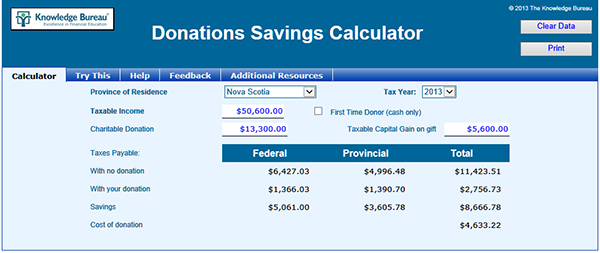Tax Efficient Gifting

As we enter the fourth quarter, you may be planning meetings with your clients to minimize the tax bite for 2013. For many clients, charitable donations form part of that plan. But how much income tax can you save by making a charitable donation.
As a non-refundable credit, one might think that it would be a simple answer—but there are several factors that affect the calculation. These factors include:
-
Province of residence (determines the size of the provincial credit)
-
Whether the donor is a first-time donor (larger credit for first-time donors in 2013)
-
The size of the gift (no credit for donations in excess of 75% of the donor’s net income)
-
Whether the donation includes publicly traded shares that have appreciated in value, and
-
The taxpayer’s taxable income (if the donation includes publicly traded shares)
To help you get quick answers to how much tax will be saved without hauling out the tax software, Knowledge Bureau has created the Donations Savings Calculator.
Example – First Time Donor
Damian lives in Ontario and has a taxable income of $50,000. Damian has never claimed the donation tax credit. How much can Damian save by donating $2,000 to the local United Way in 2013?
The calculator shows:

Because of the enhanced credit for the first $1,000 cash donated by a first-time donor, Damian’s tax bill will be reduced by more than half of the donation: $1,012.98 leaving a net cost of $987.02 for donating $2,000.
Example – Donation of Shares
Eleanor has 2,000 Royal Bank shares which are currently trading at $66.50 per share. They were passed to her as part of her husband’s estate. Her husband bought them in 2000 for $10.50 per share and transferred to her at cost. Eleanor lives in Halifax and her current taxable income is $45,000. How much taxes could she save by donating 200 of the shares to her local food bank in 2013?
By disposing of the shares, Eleanor would normally have to include a taxable capital gain of $56/share x 200 x 50% shares = $5,600. The value of the donation is $66.50 x 200 = $13,300. Putting these figures into the calculator shows:

Eleanor’s tax bill is reduced to $2,757 by making the donation. If she retained the shares, her tax bill would have been $9,354 so the donation saved her $6,597 in current taxes plus the taxes on the capital gain that will eventually have to be paid when the donation is disposed of.
The Donation Savings Calculator is one of fourteen calculators available in the Knowledge Bureau Toolkit.